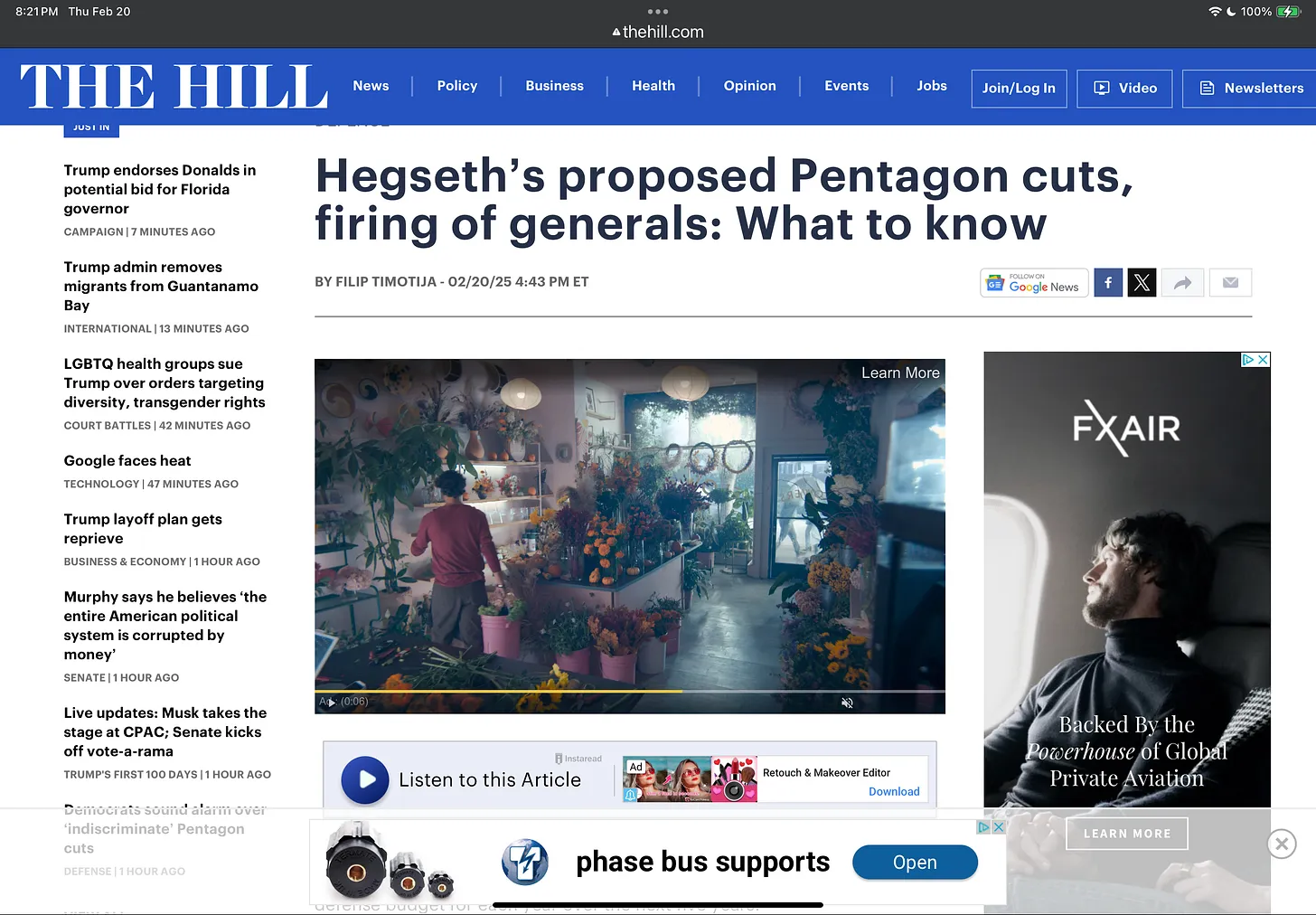
Guest Editorial: Philip Reichert
The Stand Up America US Foundation has tracked US readiness since 2007. Recruiting and readiness have declined significantly under Pentagon leadership during the Administrations of Obama and O’ Biden. Yes, you can also blame the Generals and Admirals who have not stood tall and prevented the decline of our Military. The Foundation has prepared a draft (confidential) strategic plan supporting Project 2025 for President Trump to reform and reestablish our Military. MG Vallely is chairing this strategic plan change. One example is changing the name of our Defense Department to the Department of the Armed Forces of America.
The ongoing military recruiting crisis, a topic that has dominated headlines, is not just about numbers. It's about the very future of our military strength. The Army, Air Force, and Navy all fell short of their goals last year, sparking widespread concerns over readiness and talent attraction. However, attributing the recruiting crisis to “woke culture” or inadequate benefits overlooks a more pressing issue: The absence of a just war, a cause that ignites our patriotism and inspires us to serve. This is not just a matter of recruiting soldiers; it's a matter of our military infrastructure’s readiness, a matter that should alarm us all.
Gen. Patton once said, “Americans love to fight. All real Americans love the sting and clash of battle.” The statement captures a timeless truth about the American spirit: people do not join the military because they want to file paperwork, clean offices, and do routine vehicle maintenance. When you see a recruiting commercial on television, you watch scenes of bravery unfold, and the warrior spirit persists. These scenes resonate deeply with those who feel the call to serve, the people who will raise their right hand to defend our freedom.
In 2024, America faces increasing and worrying threats from revisionist foreign entities like China, Iran, and North Korea, yet as a nation, the United States is technically at peace. This state of peace, while seemingly benign, poses a problem for a professional force with recruiting quotas and readiness metrics to meet and could potentially lead to disaster if not addressed.
The surge of enlistments after Pearl Harbor and the massive volunteer response following 9/11 demonstrated that when America is threatened, the volunteers will come. For most Americans, there is no imminent challenge to our safety. However, the potential for future threats from foreign entities should not be underestimated. It is precisely this sense of safety that discourages would-be recruits.
Our current focus should be on war variables that cannot volunteer immediately: ships, technology, and weapons systems. These critical resources require long-term investment and production. Ships and weapons take years to build, advanced technology has a very long production timeline, and weapons systems must be continually updated to stay ahead of potential adversaries.
According to the Center for Strategic and International Studies (CSIS), the entire defense-industrial base lacks the capacity, ability, and surge capability to meet the U.S. military’s wartime needs. Also noteworthy is that China is acquiring high-end weapons and equipment up to six times faster than the U.S.
Shipbuilding, vital to challenging a rising China in the Pacific, is behind schedule across the board, with some ships already years behind schedule. Right now, the Navy lacks the ships it needs for peacetime operations, and with the current infrastructure, the U.S. can’t catch up to compensate for our current needs. This will become a massive Achilles heel in a major war with China.
The problem is not just with ships but also with the weapons they fire. If conflict with China were to break out in the Taiwan Strait, America could run out of critical long-range, precision-guided munitions in under a week. It can take years to produce essential weapons systems, like anti-ship missiles, which will be vital during a major conflict.
Across the Department of Defense, critical weapons systems are being expended (or given away) faster than they’re being produced, from tomahawk cruise missiles to 155mm artillery shells. This is a dangerous gambit, as it leaves the U.S. with paltry wartime stockpiles while we lack the industrial base to produce enough for a major war of our own.
The answer isn’t as simple as increasing production when war breaks out. As we learned with Ukraine, increasing production to meet wartime demand is slow, even when motivated. Two years into the conflict, with artillery munition production woefully lacking, production is projected to reach 85,000 shells per month by fiscal year 2028. Ukraine will fire that many shells in a few days.
We need to reinvest in our military industrial base, and we needed to do so years ago. It is unacceptable that as the biggest threat to our national security is making considerable investments in their production capacity and capabilities, we allow ours to wither. If Biden believed that “we are the world power,” our military infrastructure wouldn’t steadily diminish under his leadership.
While the recruiting crisis may seem alarming, history shows that Americans have always risen to meet the enemy when it matters most. Our immediate focus should be bolstering our military's technological and logistical foundation. When the time comes, the volunteers will follow — but only if we have the tools ready for them to secure victory.[1]
























